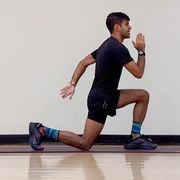Never mind the long runs, the intervals, the hill repeats. Ask runners what the most challenging part of training is, and many will say the taper. Indeed, anxiety, panic, and crankiness often come along with decreased mileage leading up to a race. Olympic Marathon gold medalist Joan Benoit Samuelson called it "PMS: Pre-Marathon Syndrome." Of course you know the value of scaling back—muscle fibers heal, extra glycogen (or fuel) is stored, the immune system rebounds. But when you've grown accustomed to pushing hard and enjoying the endorphin buzz that follows, tapering can make you feel like an addict going through withdrawal.
Despite her expertise, Cindra Kamphoff, Ph.D., still experiences taper madness. After training for the 2012 Omaha Marathon, the director of the Center for Sport and Performance Psychology in Mankato, Minnesota, almost decided to scrap the race and sign up for another one later in the year simply because she wasn't ready to taper. "I knew better, but I had a really strong urge to keep training," says the 3:05 marathoner.
To better understand this phenomenon, Kamphoff interviewed 21 marathoners in 2012, and identified two distinct types. One group—the "positive taperers"—felt energized, rejuvenated, and confident, and they were able to interpret prerace jitters as a sign that they were eager to race. The others—the "negative taperers"—felt wracked with anxiety and uncertainty and began doubting the value of the taper. "The most interesting finding was that a positive taper led to a positive race experience, and those who had a negative taper often had a negative experience," Kamphoff says. "How you feel during your taper matters on race day." Confidence—or lack of it—is a key factor. "If you spend days on end feeling negative about your training and doubtful about your abilities, those attitudes can persist on race day," she says. Plus, if you question the importance of tapering, you could disobey your taper's downtime directive, interfering with the recovery process. Runners who keep a positive outlook and remain confident in their taper's benefits are more likely to race feeling refreshed.
Since you can't completely eliminate taper-induced antsiness, the trick is reframing how you approach and work through your taper. The advice that follows will help you avoid taper traps and set the stage for an enjoyable race.
Don't: Unleash the crazy on others.
Do: Warn your family and friends that you might be a little on edge leading up to the race. Those around you will likely be more sympathetic when they understand how important the race is to you. And knowing that they are prepared—and ready to forgive and forget—can reduce your stress level, Kamphoff says. What's more, the act of opening up and verbalizing your anxiety can help you process your emotions.
Don't: Spend your downtime fixating on one ambitious, stress-inducing goal.
Do: Set multiple goals, including one that has nothing to do with the clock. Wanting to PR is fine, but it puts you under a heap of pressure to perform your very best, Kamphoff says. That's why Jeff Gaudette, a 2:22 marathoner and founder of RunnersConnect, a coaching service in Boston, has his runners set a "good," "great," and "awesome" goal. "The good goal is something that, no matter what happens, they can achieve," he says. This could include not going out too fast, or maintaining good form on hills. "The great goal may be a finish time that is achievable, and an awesome goal is something that if all the stars, the sun, and the moon align, they can accomplish." That way you're going into the race knowing that even if it turns out to not be an awesome day, it can still be a great or good day.
Don't: Eat, breathe, sleep running.
Do: Sure, it's a confidence booster to flip through your journal and see all the workouts you've logged. And it's helpful to review a course map to know where hills are. But nonstop agonizing over your race can intensify feelings of anxiety and worry. "The taper is a time to rest your body and your mind," Kamphoff says. "Feeling mentally refreshed allows you to run your best." Recognize the difference between being prepared and being obsessed. Plan taper projects (read a book—or two! organize your vacation photos—finally!) to fill your downtime and keep your mind occupied. This doesn't mean sequestering yourself from your running buddies. In fact, it can be helpful to spend time with them off the roads. "Experienced runners have been there and can assure you of your fitness and build your confidence," Kamphoff says.
Don't: Lack a plan for the future.
Do: Think beyond this event and have a sense of what you'd like to do next. Having something to look forward to "can help runners realize that their upcoming race is not the end of the world, allowing them to relax about the outcome," Gaudette says. Whether you'd like to train for a longer race, take up yoga, or learn to cook, when you have a plan for the future, you can quite literally hit the ground running as soon as you cross that finish line.
Don't: Binge on carbs.
Do: Carb-load with caution. Some runners assume that heaping bowls of pasta will equate to more race-day energy. But too many carbs can lead to bloating and inflate the water-weight gain that's normal during a taper, Gaudette says. For shorter races where you won't be on the course for more than 90 minutes, you may not have to alter your diet, says sports dietitian Pamela Nisevich Bede, M.S., R.D. The carbs you regularly consume may be sufficient fuel for your race. For longer-distance events, you need to preload with about 4.5 to 5.5 grams of carbs per pound of body weight per day. To get that, you can simply emphasize carbs on your plate during the two or three days before your race. So if you'd typically have a chicken stir-fry for dinner, change the proportions on your plate and eat more veggies while scaling back on the chicken, she says.
How to Deal with Prerace Anxiety
Stay calm and confident when your mind is filled with nerves.

Watch Next


5 Tips to Help You Prioritize Running

Treadmill Incline Workouts for Marathon Training

Heat Therapy Benefits Runners' Recovery

How Well Does AI Know Running?
Advertisement - Continue Reading Below
Advertisement - Continue Reading Below







